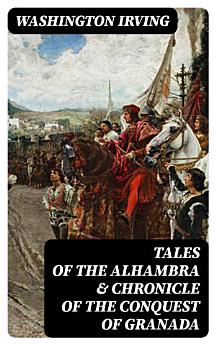Tales of the Alhambra & Chronicle of the Conquest of Granada
Washington Irving
May 2022 · DigiCat
Ebook
379
Pages
family_home
Eligible
info
reportRatings and reviews aren’t verified Learn More
About this ebook
In "Tales of the Alhambra & Chronicle of the Conquest of Granada," Washington Irving expertly weaves together a tapestry of folklore, history, and personal reflection, taking readers on a journey through the enchanting landscapes of the Alhambra in Spain. His prose is rich with romanticism and imbued with vivid imagery, capturing the grandeur of Moorish architecture and the complexities of cultural encounters. This dual collection not only presents tales that delve into the legends surrounding the majestic palace but also chronicles the historical narrative of Granada's capture, bridging the gap between myth and reality while reflecting on themes of loss, nostalgia, and the enduring allure of a bygone era. Washington Irving, a pivotal figure in early American literature, drew inspiration from his extensive travels through Europe, particularly Spain, where he became enchanted by the rich tapestry of its history and cultural heritage. His time spent collecting these stories in the picturesque setting of the Alhambra itself provided a profound personal connection, fueling his artistic endeavor to preserve and share the intricate past of this iconic landmark amidst the backdrop of American and European literary influences. This book is highly recommended for readers who appreciate a blend of history and narrative artistry. Irving's style invites contemplation of the interplay between culture and identity, making it a significant read for those interested in the romanticized past and its implications for contemporary understanding. A journey through these pages promises not only entertainment but an exploration of human experience in its myriad forms.
About the author
Washington Irving (1783–1859) was an eminent American author of the early 19th century, often hailed as one of the first to earn a living solely through his pen in the United States. With an extensive oeuvre that includes short stories, biographies, historical writings, and satire, Irving is best remembered for his mastery of the short story form and his creation of timeless characters, like Ichabod Crane from 'The Legend of Sleepy Hollow.' However, lesser known, yet equally enchanting are his works inspired by his time in Spain; notably 'Tales of the Alhambra' and 'Chronicle of the Conquest of Granada.' These works combine observational narrative with a romantic style, bringing to life the region's rich history and Moorish influences. Irving's 'Tales of the Alhambra' (1832) is particularly significant, as it intertwines travelogue, mythology, and folklore, painting an evocative picture of the historic palace and the city of Granada. Meanwhile, the 'Chronicle of the Conquest of Granada' (1829) stands as a historical account of the 15th-century overthrow of the Moorish kingdom, exemplifying his skill in narrating historical events with a literary touch. Irving's literary style, characterized by charm, wit, and a poetic prose, positioned him as a central figure in American literature, paving the way for future writers and asserting the legitimacy of American romanticism in a predominantly European literary tradition.
Rate this ebook
Tell us what you think.
Reading information
Smartphones and tablets
Install the Google Play Books app for Android and iPad/iPhone. It syncs automatically with your account and allows you to read online or offline wherever you are.
Laptops and computers
You can listen to audiobooks purchased on Google Play using your computer's web browser.
eReaders and other devices
To read on e-ink devices like Kobo eReaders, you'll need to download a file and transfer it to your device. Follow the detailed Help Center instructions to transfer the files to supported eReaders.







